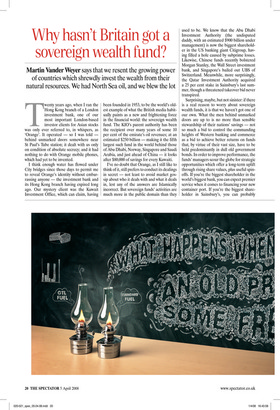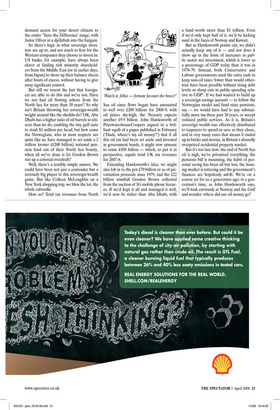Why hasn’t Britain got a sovereign wealth fund?
Martin Vander Weyer says that we resent the growing power of countries which shrewdly invest the wealth from their natural resources. We had North Sea oil, and we blew the lot Twenty years ago, when I ran the Hong Kong branch of a London investment bank, one of our most important London-based investor clients for Asian stocks was only ever referred to, in whispers, as ‘Orange’. It operated — so I was told — behind unmarked doors somewhere near St Paul’s Tube station; it dealt with us only on condition of absolute secrecy; and it had nothing to do with Orange mobile phones, which had yet to be invented.
I think enough water has flowed under City bridges since those days to permit me to reveal Orange’s identity without embarrassing anyone — the investment bank and its Hong Kong branch having expired long ago. Our mystery client was the Kuwait Investment Office, which can claim, having been founded in 1953, to be the world’s oldest example of what the British media habitually paints as a new and frightening force in the financial world: the sovereign wealth fund. The KIO’s parent authority has been the recipient over many years of some 10 per cent of the emirate’s oil revenues; at an estimated $250 billion — making it the fifth largest such fund in the world behind those of Abu Dhabi, Norway, Singapore and Saudi Arabia, and just ahead of China — it looks after $80,000 of savings for every Kuwaiti.
I’ve no doubt that Orange, as I still like to think of it, still prefers to conduct its dealings in secret — not least to avoid market gossip about who it deals with and what it deals in, lest any of the answers are Islamically incorrect. But sovereign funds’ activities are much more in the public domain than they used to be. We know that the Abu Dhabi Investment Authority (the undisputed daddy, with an estimated $900 billion under management) is now the biggest shareholder in the US banking giant Citigroup, having filled a hole caused by subprime losses. Likewise, Chinese funds recently bolstered Morgan Stanley, the Wall Street investment bank, and Singapore’s bailed out UBS of Switzerland. Meanwhile, more surprisingly, the Qatar Investment Authority acquired a 25 per cent stake in Sainsbury’s last summer, though a threatened takeover bid never transpired.
Surprising, maybe, but not sinister: if there is a real reason to worry about sovereign wealth funds, it is that we haven’t got one of our own. What the men behind unmarked doors are up to is no more than sensible stewardship of their nations’ savings — not so much a bid to control the commanding heights of Western banking and commerce as a bid to achieve better returns on funds that, by virtue of their vast size, have to be held predominantly in dull old government bonds. In order to improve performance, the funds’ managers scour the globe for strategic opportunities which offer a long-term uplift through rising share values, plus useful spinoffs. If you’re the biggest shareholder in the world’s biggest bank, you can expect premier service when it comes to financing your new container port. If you’re the biggest shareholder in Sainsbury’s, you can probably demand access for your desert citizens to the entire ‘Taste the Difference’ range, with Jamie Oliver in a djellebah into the bargain.
So there’s logic in what sovereign investors are up to, and not much to fear for the Western companies they choose to invest in: US banks, for example, have always been clever at finding rich minority shareholders from the Middle East (or in earlier days, from Japan) to shore up their balance sheets after bouts of excess, without having to give away significant control.
But still we resent the fact that foreigners are able to do this and we’re not. Have we not had oil flowing ashore from the North Sea for more than 30 years? So why isn’t Britain throwing her sovereign-wealth weight around like the sheikhs do? OK, Abu Dhabi has a higher ratio of oil barrels to citizens than we do, enabling the tiny gulf state to stash $1 million per head; but how come the Norwegians, who in most respects are quite like us, have managed to set aside a 2 trillion kroner (£200 billion) national pension fund out of their North Sea bounty, when all we’ve done is let Gordon Brown run up a colossal overdraft?
Well, there’s a terribly simple answer. We could have been not just a contender but a seriously big player in this sovereign-wealth game. But like Colleen McLoughlin on a New York shopping trip, we blew the lot, the whole caboodle.
How so? Total tax revenues from North Sea oil since flows began have amounted to well over £200 billion: for 2008-9, with oil prices sky-high, the Treasury expects another £9.9 billion. John Hawksworth of PricewaterhouseCoopers argued in a brilliant squib of a paper published in February (‘Dude, where’s my oil money?’) that if all this oil tax had been set aside and invested in government bonds, it might now amount to some £450 billion — which, to put it in perspective, equals total UK tax revenues for 2007-8.
Extending Hawksworth’s idea, we might also lob in to the pot £70 billion or so of privatisation proceeds since 1979, and the £22 billion windfall Gordon Brown collected from the auction of 3G mobile phone licences. If we’d kept it all and managed it well, we’d now be richer than Abu Dhabi, with a fund worth more than $1 trillion. Even if we’d only kept half of it, we’d be kicking sand in the faces of Norway and Kuwait.
But as Hawksworth points out, we didn’t actually keep any of it — and nor does it show up in the form of increases in public sector net investment, which is lower as a percentage of GDP today than it was in 1978-79. Instead, both Conservative and Labour governments used the extra cash to keep non-oil taxes ‘lower than would otherwise have been possible without rising debt levels or sharp cuts in public spending relative to GDP’. If we had wanted to build up a sovereign savings account — to follow the Norwegian model and fund state pensions, say — we would have had to pay substantially more tax these past 30 years, or accept reduced public services. As it is, Britain’s sovereign wealth was effectively distributed to taxpayers to spend or save as they chose, and in very many cases that means it ended up in bricks and mortar, in Britain’s absurdly overpriced residential property market.
But it’s too late now: the end of North Sea oil is nigh, we’ve privatised everything, the pensions bill is mounting, the habit of personal saving has been all but lost, the housing market is tottering and the government’s finances are hopelessly adrift. We’re on a course set for us a generation ago; in a generation’s time, as John Hawksworth says, we’ll look enviously at Norway and the Gulf and wonder: where did our oil money go?



































































 Previous page
Previous page